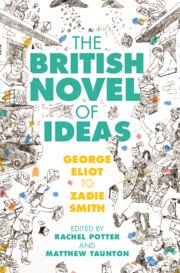Book contents
- The British Novel of Ideas
- The British Novel of Ideas
- Copyright page
- Contents
- Contributors
- Dedication
- Introduction The British Novel of Ideas
- Part I 1850–1900
- Part II 1900–1945
- Chapter 5 The British Novel of Ideas in an International Context
- Chapter 6 H. G. Wells
- Chapter 7 G. K. Chesterton
- Chapter 8 E. M. Forster
- Chapter 9 Aldous Huxley
- Chapter 10 Katharine Burdekin
- Chapter 11 Mulk Raj Anand
- Chapter 12 Storm Jameson
- Part III 1945–1975
- Part IV 1975–Present
- Bibliography
- Index
Chapter 9 - Aldous Huxley
Mysticism and Science
from Part II - 1900–1945
Published online by Cambridge University Press: 05 December 2024
- The British Novel of Ideas
- The British Novel of Ideas
- Copyright page
- Contents
- Contributors
- Dedication
- Introduction The British Novel of Ideas
- Part I 1850–1900
- Part II 1900–1945
- Chapter 5 The British Novel of Ideas in an International Context
- Chapter 6 H. G. Wells
- Chapter 7 G. K. Chesterton
- Chapter 8 E. M. Forster
- Chapter 9 Aldous Huxley
- Chapter 10 Katharine Burdekin
- Chapter 11 Mulk Raj Anand
- Chapter 12 Storm Jameson
- Part III 1945–1975
- Part IV 1975–Present
- Bibliography
- Index
Summary
This chapter examines the tension between mysticism and science in Aldous Huxley’s novels of ideas. It deploys the new critical terminology of Rachel Potter and Matthew Taunton and illustrates its utility. Those Barren Leaves (1925) is a good example of the ‘comic novel of ideas’, in that the high seriousness of Cardan and Calamy’s disputations is interspersed with low farce. Point Count Point (1928) exemplifies the ‘serious novel of ideas’: in addition to staging a Hegelian dialectic between the paganism of Rampion and the Manicheanism of Spandrell, the narrative tests their ideas. Eyeless in Gaza (1936) is an ‘asymmetric novel of ideas’: the dialectic between a version of D. H. Lawrence’s philosophy and a broadly Buddhist worldview is enacted in the person of Anthony Beavis, rather than being expounded in ‘character-character dialogue’. Beavis’ metaphor of the ocean and the waves signals the triumph of mysticism over Lawrence’s ‘psychological atomism’.
Keywords
- Type
- Chapter
- Information
- The British Novel of IdeasGeorge Eliot to Zadie Smith, pp. 166 - 179Publisher: Cambridge University PressPrint publication year: 2024

